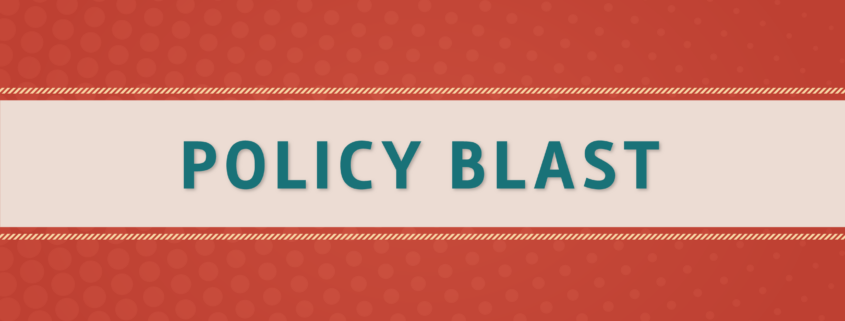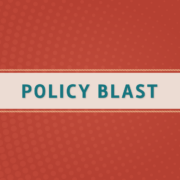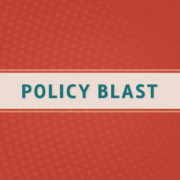NCUIH Secures Huge Wins for Urban Indians in Final Enacted COVID-19 and Omnibus Bills
Policy Update: NCUIH Secures Huge Wins for Urban Indians in Final Enacted COVID-19 and Omnibus Bills
The bills include a $5 million increase for urban Indian health, FTCA, VA-IHS reimbursements, SDPI extension and COVID-19 renovation funds for UIOs.
On December 27, the “Consolidated Appropriations Act, 2021” (H.R. 133), consisting of a COVID-19 pandemic relief bill and an omnibus spending bill for Fiscal Year (FY) 2021 was signed into law. Due to the tireless advocacy by NCUIH and UIOs, there are many monumental wins for urban Indian health. Throughout the year, NCUIH assisted with facilitating over 25 calls for UIOs with federal agencies and held over 100 meetings with Congress. NCUIH representatives testified in over 13 Congressional hearings to advocate for the many long-standing priorities that were included in the final package.
Your advocacy and participation in the federal government process was critical to the adoption of the most robust urban Indian health provisions in over 50 years.
Short Overview
In summary, the package included the following National Council for Urban Indian Health (NCUIH) priorities for Urban Indian Organizations (UIOs):
- $62.7 million for Urban Indian Health in FY21, a $5 million increase from FY20
- $1 million to conduct an infrastructure study for facilities run by UIOs
- NCUIH is working with IHS Office of Urban Indian Health Programs now to review the next steps on the study.
- Reimbursement from the United States Department of Veterans Affairs (VA) to UIOs for urban Native veterans’ health
- In 2010, the VA issued a MOU stating that all Indian Health Care Providers were eligible for reimbursement for services to Native veterans. NCUIH has fought tooth and nail with the Administration on their narrow interpretation of this MOU to be exclusive of UIOs. This legislation now expressly affirms that the VA must reimburse UIOs for services provided to veterans.
- FTCA Coverage for UIOs
- For over 20 years, FTCA coverage for UIOs has been a top priority and finally, for the first time ever, UIOs will no longer have to pay for costly insurance coverage for health providers. This will save a single UIO up to $250,000 annually!
The package provides the following for IHS, Tribal organizations and UIOs:
- $210 million from CDC to IHS to I/T/U for COVID-19 vaccine distribution and administration
- NCUIH requested a minimum of 5% set-aside for I/T/U and $210 million is equal to 4.67%.
- Funds “may be used for grants for the construction, alteration, or renovation of non-Federally owned facilities to improve preparedness and response capability” related to COVID-19, which was confirmed by IHS on January 5, 2021. IHS explained that they are exploring alternative mechanisms including IHCIA Contracts for UIOs to use the funds related to facility improvements from the $210 million. NCUIH will advocate that UIOs should be eligible for this funding through IHCIA contracts. We will continue to monitor and follow up with IHS as more information becomes available.
- $790 million to IHS for I/T/U for necessary expenses for testing, contact tracing, surveillance, containment, and mitigation
- These funds must be made available within 21 days: January 17, 2021.
- On a UIO leaders call with IHS on January 5, 2021, IHS stated that UIOs are eligible to use these funds for the “rent, lease, purchase, acquisition, construction, alteration, renovation, or equipping of non-federally owned facilities to improve coronavirus preparedness and response capability.”
- Extends SDPI through FY2023 at current levels ($150 million annually)
- $125 million set aside for I/T/U in funding for Substance Abuse and Mental Health Services Administration (SAMHSA)
- $15 million to make payments under the National Health Service Corps loan repayment program
- Obesity prevention and reduction programs in consultation with Indian Tribes, Tribal organizations, and urban Indian organizations
- Establish “Sec. 330n. Expanding Capacity for Health Outcomes” in Title 3 of the Public Health Service Act to include Indian Tribes, Tribal organizations, and urban Indian organizations
Next Steps
- NCUIH submitted Urban Confer comments regarding the COVID-19 relief supplemental to IHS on Friday, January 8, 2021 and will continue to work with IHS on the UIO infrastructure study.
Analysis
Urban Indian Health
- $62.7 million for Urban Indian Health in FY21, a $5 million increase from FY20
- $1 million to conduct an infrastructure study for facilities run by UIOs
- FTCA Coverage for UIOs (H.R. 6535/S. 3650)
- Note: This bill was also enacted on January 5, 2021, in addition to being included in the package.
- Urban Native Veterans Health Access Act
- Reimbursement from VA to UIOs for urban Native veterans’ health
Indian Health Service
- $6.236 billion in agency funding for IHS in FY21
- ~$189 million over the FY2020 enacted level
Facilities
- $58 million to IHS for costs for accreditation emergencies and supplementing activities funded under the heading ‘‘Indian Health Facilities’’
- $72.28 million for the Indian Health Facilities account
105(l) Leases
- $101 million indefinite appropriation
- Does not include restrictive language based on square footage
Health and Human Services (HHS)
IHS / Tribal Facilities / Urban Indian Organizations (UIOs)
- National Health Service Corps
- $15 million to Indian Health Service facilities, Tribally Operated Health Programs, and Urban Indian Health Programs to make payments under the National Health Service Corps loan repayment program
- Good Health and Wellness in Indian Country (GHWIC)
- $22 million in funding for the Good Health and Wellness in Indian Country (GHWIC) program
- Minority HIV/AIDS Prevention and Treatment Program
- $1.5 million Tribal set-aside under the Minority HIV/AIDS Prevention and Treatment Program
HRSA
Native Hawaiian Health Care
- $20.5 million (minimum) for the Native Hawaiian Health Care Program
COVID-19 Response
CENTERS FOR DISEASE CONTROL AND PREVENTION (CDC)
- $8.75 billion for CDC-wide activities and program support to prevent, prepare for, and respond to coronavirus, domestically or internationally
IHS / Tribal Facilities / Urban Indian Organizations (UIOs)
- $210 million shall be allocated to IHS to be distributed through IHS directly operated programs, Tribes and Tribal organizations, and UIOs to plan, prepare for, promote, distribute, administer, monitor, and track coronavirus vaccines to ensure broad-based distribution access and vaccine coverage
- Funds “may be used for grants for the construction, alteration, or renovation of non-Federally owned facilities to improve preparedness and response capability” related to COVID-19, which was confirmed by IHS on January 5, 2021.
Tribal Use of Prescription Drug Monitoring Programs (PDMP)
- “CDC is directed to work with the Indian Health Service to ensure Federally-operated and tribally operated healthcare facilities benefit from the CDC’s PDMP efforts”
VA-TAC
- The final bill also outlines concerns with the Tribal Advisory Committee (TAC), noting in the explanatory statement that “The agreement directs the Director, in consultation with the TAC, to develop written guidelines for each CDC center, institute, and office on best practices around delivery of Tribal technical assistance and consideration of unique Tribal public health needs. The goal of such guidelines should be the integration of Tribal communities and population needs into CDC programs. The Director shall report on the status of development of these written guidelines in the fiscal year 2022 Congressional Justification”.
- Note: The TAC includes UIOs
SUBSTANCE ABUSE AND MENTAL HEALTH SERVICES ADMINISTRATION (SAMHSA)
- $4.25 billion to provide increased mental health and substance abuse services and support
IHS / Tribal Facilities / Urban Indian Organizations (UIOs)
- $125 million (minimum) set aside for I/T/U under SAMHSA for mental/behavioral health
Medication-Assisted Treatment for Prescription Drug and Opioid Addiction
- $11,000,000 for grants to Indian Tribes, Tribal Organizations, or consortia. The agreement directs SAMHSA to ensure grants allow the use of medication-assisted treatment and other clinically appropriate services to achieve and maintain abstinence from all opioids, including programs that offer low-barrier or same day treatment options.
- Note: UIOs are not specified, though a 2018 NOFO did list UIOs as eligible
PUBLIC HEALTH AND SOCIAL SERVICES EMERGENCY FUND
IHS / Tribal Facilities / Urban Indian Organizations (UIOs)
- $790 million to I/T/U for necessary expenses for testing, contact tracing, surveillance, containment, and mitigation
- IHS stated that UIOs are eligible to use these funds for the “rent, lease, purchase, acquisition, construction, alteration, renovation, or equipping of non-federally owned facilities to improve coronavirus preparedness and response capability.”
- Funds available until September 30, 2022
- Includes language authorizing transfer of funds to IHS
- Requires funds to be dispersed within 21 days
- Requires Tribes, states and other funding recipients to update their plans within 60 days of receiving funds
SPECIAL DIABETES PROGRAM FOR INDIANS (SDPI)
- Extends SDPI through FY2023 at current levels ($150 million annually)
- Includes language reaffirming the existing protections against balance billing of AI/ANs under Indian Health Care Improvement Act and requirement that inpatient hospitals accept the Medicare-Like Rate as “payment in full” when contracting with IHS/Tribes under Purchased/Referred Care
GUIDE ON EVIDENCE-BASED STRATEGIES FOR OBESITY PREVENTION PROGRAMS
IHS / Tribal Facilities / Urban Indian Organizations (UIOs)
- Obesity prevention and reduction programs in consultation with Indian Tribes, Tribal organizations, and urban Indian organizations
BROADBAND CONNECTIVITY GRANTS
- $1 billion for the Department of Commerce’s Assistant Secretary of Communications and Information to expand broadband, remote learning, telework, and telehealth access and adoption by grants to the following qualifying entities:
- Tribal governments; Tribal Colleges or Universities; Tribal Organizations; Alaska Native Corporations, or the Department of Hawaiian Homelands (Does Not Include UIOs)
PUBLIC HEALTH PROVISIONS
Public Health Service Act
- Establish “Sec. 330n. Expanding Capacity for Health Outcomes” in Title 3 of the Public Health Service Act to develop a program for eligible entities to expand the use of technology-enabled collaborative learning and capacity building models, to improve retention of health care providers, and increase access to health care services in rural areas, frontier areas, health professional shortage areas, or medically underserved areas and for medically underserved populations or Native Americans.
- Eligible entities include Indian Tribes, Tribal organizations, and urban Indian organizations
- Authorizes $10,000,000 for each of fiscal years 2022 through 2026 to carry out this section
The full legislative text of the entire year-end package can be found here
The Explanatory Statement (Report) for FY2021 Interior (Division G) can be found here
The Explanatory Statement (Report) for FY2021 LHHS (Division H) can be found here
| Topic | Section | Funding | Language | |
| Urban Indian Health | Urban Indian Health | $62,684,000 |
|
|
| UIO Infrastructure Study | $1,000,000 |
|
||
| FTCA | – |
|
||
| IHS-VA MOU – reimbursement from VA to UIOs who provide services to AI/AN veterans | – |
|
||
| Indian Health Service (IHS) | IHS funding | $6,236,279,000 |
|
|
| Costs for accreditation emergencies and supplementing activities funded under the heading ‘‘Indian Health Facilities’’ | $58,000,000 |
|
||
| Indian Health Care Improvement Fund | $72,280,000 |
|
||
| 105(l) leases indefinite appropriation | $101,000,000 |
|
||
| Health and Human Services | NHSC Loan Repayment Program | $15,000,000 |
|
|
| Good Health and Wellness in Indian Country | $22,000,000 |
|
||
| Minority HIV/AIDS Prevention and Treatment Program | $1,500,000 |
|
||
| HRSA— Hawaiian Health Care Program | $20,500,000 |
|
||
| COVID-19 Response | CDC COVID-19 Response | $8,750,000,000 |
|
|
| CDC to IHS to I/T/U for COVID | $210,000,000 |
|
||
| SAMHSA— Heath Surveillance and Program Support | $4,250,000,000 |
|
||
| Set aside for I/T/U in funding for SAMHSA | $125,000,000 |
|
||
| Medication-Assisted Treatment for Prescription Drug and Opioid Addiction | $11,000,000 |
|
||
| Public Health and Social Services Emergency Fund | IHS to I/T/U for testing, contact tracing, surveillance, containment, and mitigation | $790,000,000 |
|
|
| Special Diabetes Program for Indians (SDPI) | SDPI | Extends SDPI through FY2023 at current levels |
|
|
| Guide on Evidence-Based Strategies for Public Health Department Obesity Prevention Programs | Obesity prevention and reduction programs in consultation with Indian Tribes, Tribal organizations, and urban Indian organizations | Creation of a guide of evidence-based strategies |
|
|
| Broadband Connectivity Grants | Tribal Broadband | $1,000,000,000 |
|
|
| Public Health Provisions | Title 3 of the Public Health Service Act is amended by inserting Sec. 330N | $10,000,000 |
|
|









Leave a Reply
Want to join the discussion?Feel free to contribute!